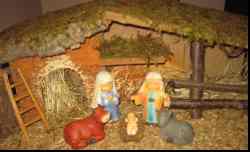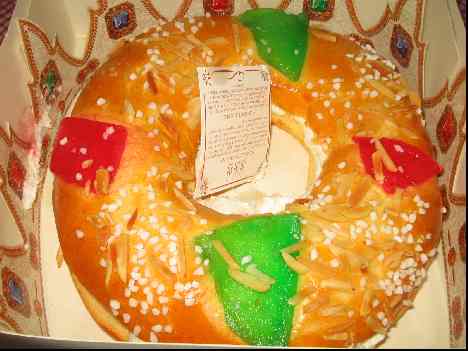|
Christmas in SpainKnown as "Pascuas" christmas in Spain is a somewhat drawn out affair covering between the 24th of December up to the 6th of January. As in every country around the world each family celebrates the christmas holidays in a slightly different way and as such strictly speaking there is no "typical Spanish Christmas" but instead certain families choose to observe various traditions or not. This page attempts to explain the different aspects and traditions of christmas in Spain although don't be surprised if some a Spaniard says "we don't do that" the next Spaniard you meet will probably say "Yes, we've always done that"! The christmas holidays in Spain cover three main concepts and we've broken down the page into three easily "digestable" sections to cover each:
Pre ChristmasApart from shopping for christmas presents at exorbitant prices (something similar the world over) Spaniards also maintain some distinct christmas traditions and even curious practices:
Spanish christmas markets
Belenes - Nativity scenes 
The Spanish christmas tradition of building a navity scene is one shared with other countries however the Spanish version can be considered as far more elaborate than those that the family gathers round for an afternoon and builds from cardboard and double sided sticky tape! In the Spanish nativity highly detailed figurines (which can cost anything from 5€ to 100€ each) are placed inside a wooden manger covered in fresh moss and accompanied by any number of "add ons" which can include working streams, fountains and even representations of torches for lighting. For many families the "Belen" as it is known is something to which you add one or two pieces each year depending on your economic means.
Spanish christmas lottery
Fish and Seafood
Spanish christmas hampers
Christmas lights
Spanish ChristmasChristmas in Spain centers around two days the 24th and 25th of December. With the night of the 24th being the more important of the two and known as "Noche buena" roughly translated as "The good night". This is not to be confused with "Noche Vieja" or "Old night" which is the 31st December. It is important to remember that different Spanish cities and regions have some distinct additional celebrations during the 24th and 25th and these are not detailed here.
24th December - Noche Buena Once reunited with their families the night of the 24th sees a formal set down meal in many households comprising of three or four courses and generally of the highest possible quality available. As mentioned earlier this was traditionally predominantly seafood but nowadays roast suckling pig or lamb is more commonly encountered. In the greatest of Spanish traditions this is all "washed down" with copious amounts of alcoholic beverages. Depending on ech family this can also be the night on which Children (and adults) open none, some or all of their presents. Strictly speaking presents should be exchanged on the 6th of January but this is now being disregarded with the majority of presents opened on the 24th and an additional gift being opened on the 6th. Similar to some other countries the evening of the 24th at 2100 sees the King of Spain address the nation with a christmas message which focuses on the years developements, wishes for the future and a general salutation for a happy christmas all round. Most families (whatever their perception of the Monarchy) will still sit down and watch the complete speech. Visitors to Spain during christmas should be aware that the evening of the 24th of December will see 99% of shops, restaurants and bars being closed.
25th December - Dia de Navidad It is typical that each village, town or city has a number of public events programmed for the afternoon and evening of the 25th of December and even shops open on this day. Visitors spending the 25th in Spain should contact the tourist information of their destination for the precise list of events taking place as this changes every year.
6th January - ReyesReyes refers to Kings day (Rey = King) and is based upon the nativity story where the 3 kings arrive bearing gifts for the baby Jesus. In the catholic church this is believed to have happened a good week or so after the birth and the 6th of January has been decread as the day of the kings arrival. This at least is the logic behind the Spanish tradition of giving christmas presents on the 6th of January instead of the 24/25th December.In Spain children are told to leave a pair of shoes outside on the balcony so that the kings know the house is occupied and to leave gifts. The logistics being that the parents will put a small gift inside the shoe and the remainder in the living room whilst the kids are asleep. A concept most parents will be familiar with! Whatever the location of the presents the morning of the 6th is spent opening presents and mid morning will see kids pouring out onto the streets to play with and compare their new toys. Just as well considering that the parents are "back in the kitchen". Midday on the 6th sees the average Spanish family sit down for a formal Spanish lunch with, in many cases, the extended family gathered round. Whilst normally not as extensive as the christmas fare the menu is normal about quality rather than quantity, probably something to do with the effects of the xmas excesses begining to be felt! One indulgence however is the traditional "Roscon de reyes" which is a large circular donought shaped baked pastry/cake that is sliced open and filled with cream. Added to the Roscon before the baking stage are two small suprises: a gift and a large runner bean. The Spanish tradition is that he who encounters the gift will have good luck whilst he who encounters the bean has to pay for the Roscon!!!
Apart from Christmas in Spain there are numerous other Unique and interesting fiestas...> |
